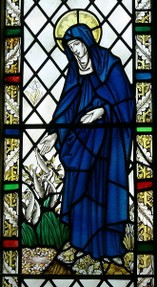 It's a snippet repeated time and time again by High Priestesses at each handfasting. The Lady before us isn't just any old Goddess. She is wearing the aspect of the Goddess Bride.
It's a snippet repeated time and time again by High Priestesses at each handfasting. The Lady before us isn't just any old Goddess. She is wearing the aspect of the Goddess Bride.
I say it, when I officiate. I learned to say it from those who initiated me. I've heard those who followed me say it at handfastings. Insofar as traditions can be static in a Pagan wedding, then this is a strong one.
When it was taught to me, it was alongside the speculation that all brides are so called because of Bride. It was borrowed from the Pagan religions by Christianity. I was equally told that the groom is so named because he's a link to the Horned God - the leader of all wild things.
However, I'm always keenly aware of the propensity of my Wiccan forebears to make stuff up or misunderstand history, in order to present Wicca as a solid continuance, rather than a revival based on wisps of knowledge.
Even the most cursory investigation doesn't allow that claim to stand up. Which doesn't mean to say that a Wiccan bride cannot take on the aspect of the Goddess Bride. In fact, it fits perfectly, if you have to pick any Goddess at all, rather than letting the divine shine within her naturally.
Brighid - as both Goddess and Saint - governs the hearth, healing, poetry/stories, caring for the livestock (sheep, cattle, bees etc.), crafting, smithing and the threshold of a home. Amongst a lot of other things. She is one of the main Mother Goddesses of Ireland, even if She is most associated with the spring.
In short, Brighid is a good Goddess to have around the house. She makes the home! Which is why She can be perfectly aligned with the traditional role of a wife. Wiccans, on the whole, are far more egalitarian about home-making, but no-one can deny that women have been generally viewed as the home-maker throughout history.
Is the Wiccan Bride actually the Goddess Bride? If she's preparing to take the lead in the daily running of a home, then yes, it works. It also explains why the groom is the recipient. She's symbolically saying that she will provide food for him.
But unfortunately, Brigid has nothing to do with why we call a bride by that name, whatever my Wiccan elders told me.



 I usually announce it, because there's a strong likelihood of non-Pagans amongst those watching. They may not know that a deity now stands before them.
I usually announce it, because there's a strong likelihood of non-Pagans amongst those watching. They may not know that a deity now stands before them.


 It's a snippet repeated time and time again by High Priestesses at each handfasting. The Lady before us isn't just any old Goddess. She is wearing the aspect of the Goddess Bride.
It's a snippet repeated time and time again by High Priestesses at each handfasting. The Lady before us isn't just any old Goddess. She is wearing the aspect of the Goddess Bride.


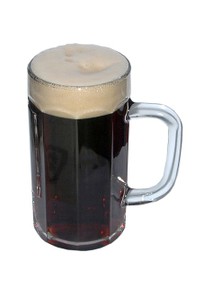 The word bride comes from the same root as words like brew or broth, which may give you a hint to the meaning here.
The word bride comes from the same root as words like brew or broth, which may give you a hint to the meaning here.





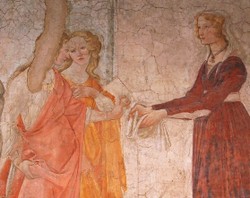

 St Tydecho's Churches in West Waleson 09/03/2014
St Tydecho's Churches in West Waleson 09/03/2014
 Goodies for an Outlander Premiere Partyon 03/06/2015
Goodies for an Outlander Premiere Partyon 03/06/2015
 Holocaust Memorial Day Interview with Rainer Höss, Grandson of Rudolf Architect of Auschwitzon 01/24/2015
Holocaust Memorial Day Interview with Rainer Höss, Grandson of Rudolf Architect of Auschwitzon 01/24/2015
 Romantic Valentine Gifts for an Outlander Fanon 01/16/2015
Romantic Valentine Gifts for an Outlander Fanon 01/16/2015

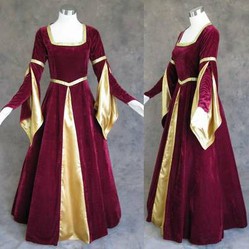
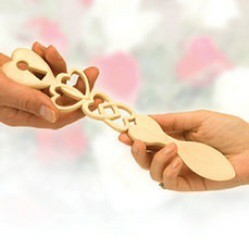

Comments
You're welcome. Thank you for reading it. :)
Very interesting, thank you xx
You're welcome. :)
Oops! Your prospective 'man-child' is going to kill me! But if he attempts to push the 'bride is the cook, get into the kitchen and make me a sandwich' line, you could always point out that 'bridegroom' is effectively the cook's assistant. You get to sit back and supervise, while he does the hard work. That's how I read it anyway. :D
Another fascinating insight into Wiccan wedding ceremonies, it's amazing how little is known about this compared to other religious weddings. Thanks for the information.
Although finding out "bride " means cook was disappointing, your articles are really changing my perspectives of marriage!